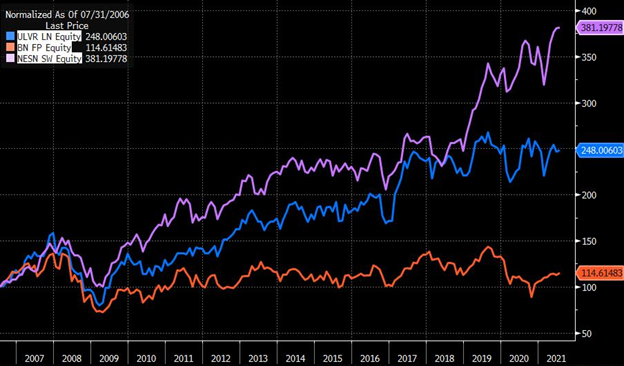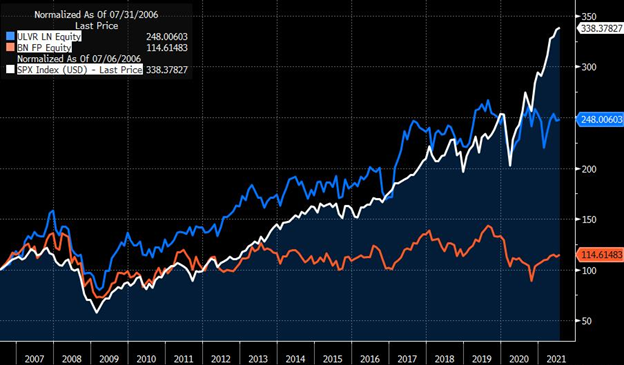Robert G. Eccles is Visiting Professor of Management Practice; Colin Mayer is the Peter Moores Professor of Management Studies; and Judith Stroehle is Senior Research Fellow at University of Oxford Saïd Business School. Related research from the Program on Corporate Governance includes The Illusory Promise of Stakeholder Governance and Will Corporations Deliver Value to All Stakeholders?, both by Lucian A. Bebchuk and Roberto Tallarita (discussed on the Forum here); For Whom Corporate Leaders Bargain by Lucian A. Bebchuk, Kobi Kastiel, and Roberto Tallarita (discussed on the Forum here); and Restoration: The Role Stakeholder Governance Must Play in Recreating a Fair and Sustainable American Economy—A Reply to Professor Rock by Leo E. Strine, Jr. (discussed on the Forum here).
Corporate purpose and sustainability (often referred to by the acronym of ESG for environmental, social, and governance) are now part of the mainstream lexicon in the corporate and investment communities. The two terms are often used interchangeably as synonyms. This is wrong. Purpose and sustainability are related but different ideas. Purpose comes first. Sustainability can either contribute to it or can detract from it.
As one of us (Mayer) has written, the purpose of a company “is to produce profitable solutions to problems of people and planet,” while at the same time “not profiting from producing problems for people or planet”—a failure in sustainability. Companies that are making investments in sustainability while failing to produce profitable solutions to people and planet are also failing in purpose. Companies that are profitable while degrading the environment and society are focused on profits, not purpose. Danone is an example of the former and ExxonMobil is an example of the latter.
| High Profitability | Low Profitability | |
|---|---|---|
| High Sustainability | Purpose Company | Financially unsustainable Company |
| Low Sustainability | Socially unsustainable Company | Walking Dead |
Danone, famous for its commitment to sustainability, took this one step farther by converting to an enterprise à mission in July of 2020 with a 99 percent shareholder vote in favor of this move. Under this legal structure the company commits to social and environmental goals which it is obligated to meet. This structure is not intended to force a trade-off with profits; rather it is seen as a way of ensuring the ability of a company to generate them over the long term. Three years previously Danone North America was created as a Public Benefit Corporation, the U.S. equivalent of the enterprise à mission.
Over the past few months, much has been written about the ouster of Emmanuel Faber as the Chairman and CEO of Danone in March 2021 , with many saying it was because two activist investors, Artisan Partners and Bluebell Capital Partners, didn’t like the company becoming a beacon for stakeholder capitalism by converting to an enterprise à mission. Some worried that these two investors, holding around six percent of the company’s shares, were after short-term profits at the expense of sustainability. Mary Johnstone-Louis and Charmian Love have written that this is a vastly oversimplified interpretation and further argued that the relationship between profits, people, and planet needs to be set in a broader systems context. We’ll come back to this point later.
Danone’s stock price had been underperforming its major competitors, Nestle and Unilever, both also well-known for their commitment to sustainability (Figure 1). While Danone’s stock price has been virtually flat for the past 10 years, both Nestle and Unilever have seen notable improvement. The Financial Times reported that in a letter sent by Bluebell to Danone, the investor cited “a combination of poor operational record and questionable capital allocation choices” as the reasons for this stock price underperformance.
Neither Bluebell nor Artisan have the stereotypical trappings of activist hedge funds in search of short-term profits at the expense of the long-term. Both are signatories to the Principles of Responsible Investment. Both discuss sustainability and emphasize a commitment to long-term investing. Bluebell notes that “As active long-term investors we are naturally focused on material ESG factors which can impact the performance of the companies in which we invest, and the responsible stewardship of our investments.” Artisan states that “As an investment firm, we consider sustainability/ESG matters both in our investment activities and in how we execute our business model.” Its website provides an extensive discussion of its ESG Approach, ESG Integration, Engagement, and Proxy Voting. Itself a listed company, it also describes the firm’s own approach to sustainability/ESG.
Neither of these firms are opposed to sustainability. What they were opposed to was Danone’s failure to make its commitment to sustainability in support of its purpose: “bringing health through food to as many people as possible.” In vivid contrast is Unilever. Under its previous CEO Paul Polman and current CEO Alan Jope, the company is one of the worlds’ preeminent companies when it comes to sustainability in service of purpose. This is evidenced by over three decades of sustained stock price performance in relation to both Danone and the wider market (Figure 2).
ExxonMobil is an example of a company failing to deliver both profitably and ethically on its purpose of “being the world’s premier petroleum and chemical manufacturing company” which “must continuously achieve superior financial and operating results while adhering to high ethical standards.” In this case, it is due to the company’s failure in sustainability. While Danone is at least trying to transform its business model in response to how the world is changing, ExxonMobil has remained obdurate in ignoring the implications of the needed energy transition to address climate change. It has continued investing billions to drill for unneeded oil and gas. In doing so, it has watched its return on capital employed fall from an average of around 35% from 2001-2010 to around 6% from 2015-2019 and its market cap drop by around three-quarters from its peak of $527 billion in 2007 to a low-point of $139 billion in 2020. ExxonMobil was kicked out of its 92 years in the Dow Jones Industrial Average in 2020 and S&P has downgraded its credit rating twice over the past five years.
And along comes another activist investor to help a company put sustainability in service of purpose. In this case it was the new and tiny Engine No. 1 that took a miniscule $40 million stake in the company, representing less than 0.02 percent of its value. Two months after Faber’s departure at Danone, Engine No. 1 successfully elected three new members to the board of directors at ExxonMobil’s annual shareholder meeting on May 26, 2021.
Many were dubious they would be successful in doing this. Writing in January of 2021, we explained why we thought the firm had a good chance of succeeding. The essence of Engine No. 1’s campaign was the company’s poor strategy and capital allocation decisions which had resulted in the company underperforming its peers over any given period of time, hardly making it the world’s premier petroleum and petrochemical company with superior financial and operating results and at the same time making the world worse in terms of climate change. While also being ethically dubious about carbon taxes as recently revealed by Greenpeace. Engine No. 1 made a compelling case for why the company needed new board members with energy experience to enable the company to “better position itself for long-term, sustainable value creation.” In other words, the company’s disregard for sustainability was making the company itself unsustainable.
But that is not the end of the matter. Sustainability is a moving target for companies. As the world grapples with climate change, biodiversity loss, resource scarcity, inequality in its many forms, the increasing concentration of wealth in a tiny fraction of the population, and access to healthy foods and healthcare, the bar is being raised for what companies need to do to avoid being regarded as “profiting from producing problems for people or planet.” Regulators, legislators, and the courts—often pushed by NGOs—play a key role here.
Royal Dutch Shell is currently experiencing this. The same day as ExxonMobil’s annual meeting, The Hague District Court ordered the company to reduce its CO2 emissions of the Shell group by net 45% in 2030 compared to 2019 levels, through the Shell group’s corporate policy. The lawsuit was brought by seven climate activist groups collectively referred to as “Milieudefensie et al.” Although Shell said it was disappointed in the ruling and said it would appeal, the difference between it and ExxonMobil couldn’t be more stark.
Shell’s purpose is to “power progress together with more and cleaner energy solutions.” In 2020, the company committed to become a net-zero emissions energy business by 2050 and in 2021 it was the first energy company to offer investors an advisory vote on its energy transition strategy. It has also linked executive compensation to its target for reducing its Net Carbon Footprint. Yet a group of climate activists argued that the company was not doing enough, and the Court agreed.
Shell is facing a challenge that many companies will confront in the near future—a shift in where society more clearly draws the line between problem-solving sustainable solutions and problem-producing unsustainable detriments. The Court concluded that the company was not doing enough on sustainability. The company argued that the “reduction obligation” would put it at a competitive disadvantage. The Court did not find this argument compelling. It acknowledged that “the reduction obligation requires a change in policy” that “could curb the potential growth of the Shell Group.” It even went so far as to state that “the interest served with the reduction obligation outweighs the Shell’s group’s commercial interests.”
In other words, what Shell regarded as a profitable solution, the Court viewed as unsustainable business behavior. By taking this position, the Court raised the bar for Shell on how it needs to adapt its strategy to fulfill a purpose of profiting from producing solutions not problems.
Furthering the irony, should Shell not find ways to meet these raised sustainability obligations and remain competitively profitable, it could become the Danone of the oil and gas industry. The result would be an opportunity for an activist investor to step in to help it do so. But if Shell does rise to the occasion, the bar will have been raised for all other oil and gas companies. In other words, competition of the future will relate to levels of sustainability as well as profitability, i.e., runs to the top for shareholders and the environment, not just the former, and therefore create an inherent incentive for purpose.
Long-term sustainable value creation starts with clarity of purpose. The products and services that are the solutions for people and planet will need to change as the world evolves in terms of its sustainability concerns about the negative externalities created by these solutions. Addressing these externalities must be done in a way that keeps the solutions profitable. Failure to do so will result in sustainability detracting from purpose, rather than supporting it. And as all of Artisan, Bluebell and Engine No.1 exemplify, there is a newly emerging industry of activist investors hungry to target not just financial underperformance but what it means to be sustainably profitable.
Figure 1. Danone vs. Competitors, normalized share price development.

Note: All data recovered from Bloomberg on July 2nd 2021, all data normalized for ULVR (Unilever), BN FP (Danone), and NESN (Nestle SA).
Figure 2. Unilever outperforms market

Note: All data recovered from Bloomberg on July 2nd 2021, all data normalized as of July 2006 for ULVR (Unilever) and BN FP (Danone). S&P normalized score based on June 2006.
 Print
Print